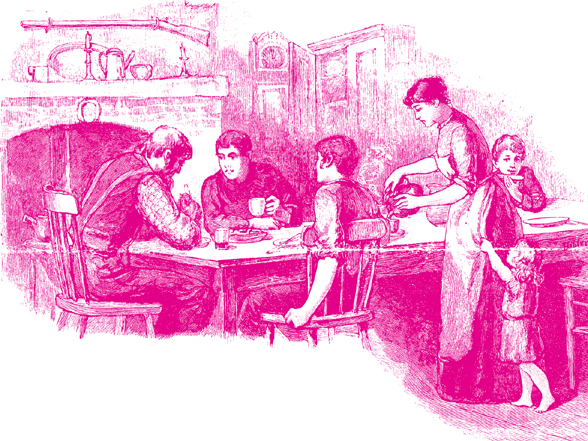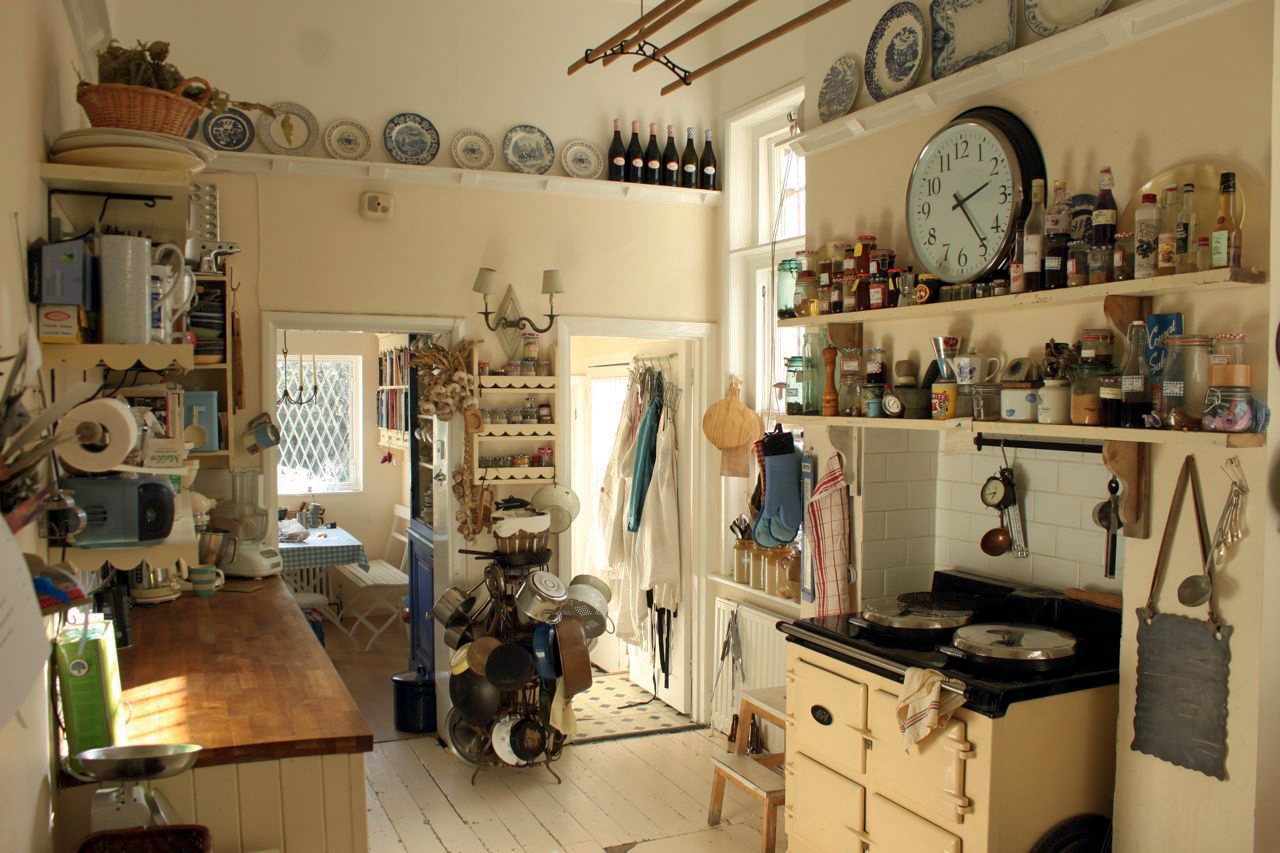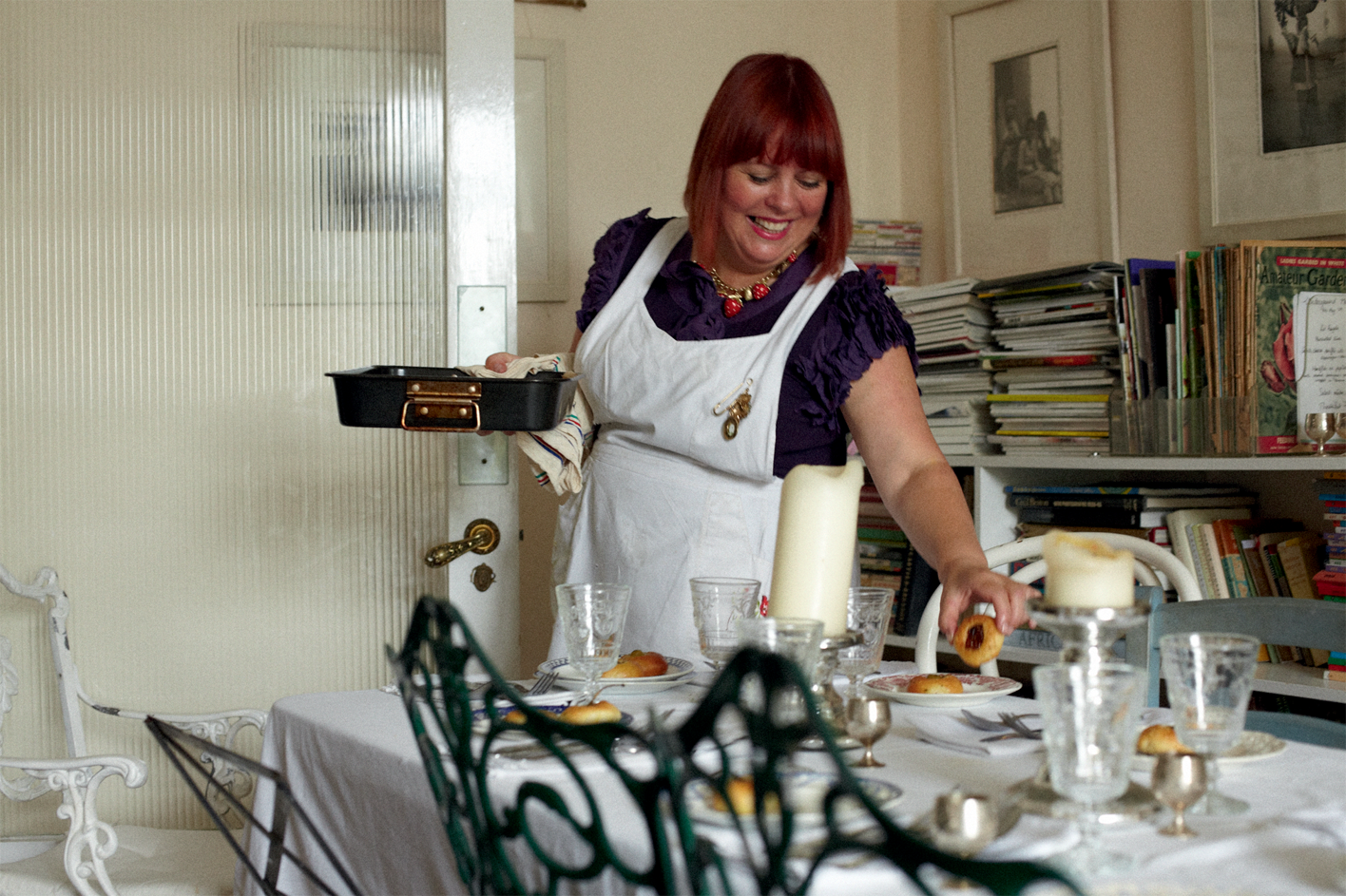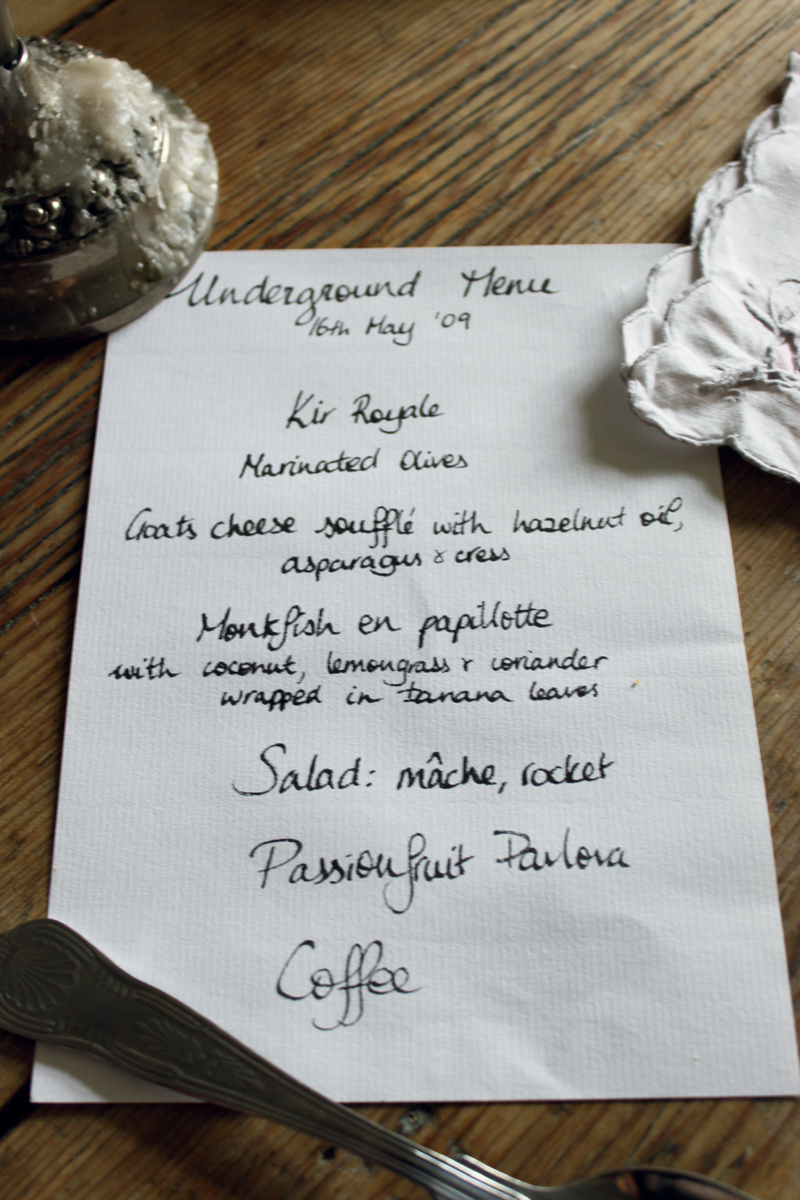
Полная версия
Supper Club: Recipes and notes from the underground restaurant

My philosophy stems from a punk, do-it-yourself ethic. You don’t need a degree in music to start a band, you don’t need permission from the authorities or a catering-college diploma to start a restaurant. Some of the best chefs are self-taught: Raymond Blanc and Heston Blumenthal are two well-known examples. Sometimes, not having a formal education can help you think differently, laterally.
I had an unusual route into food. I did not go to catering college, I did not do a ‘stage’ at a top restaurant, I have not worked in ‘normal’ restaurants at all. Of course, I got the usual grounding that many receive from their mothers and grandmothers and from the societal expectation that being in possession of mammaries and ovaries should lead inevitably to being in charge of cooking dinner.
I’ve wondered, ‘Why am I doing this?’ Why am I sacrificing my social life (I never go out from Thursday to Sunday nowadays), my living room (life is lived in my bedroom, the living parts of the flat have shrunk to bedsit proportions), my mental health (my daughter says my personality totally changes every weekend; I turn into a stressed-out monster).

But then something like this happens...
One evening, from the kitchen, I heard a glass being clinked in the living room, then quiet. Somebody was speaking seemingly to the entire room.
Agog, I sneaked out to have a look. A young woman was standing up, introducing herself and saying, ‘It’s such a nice atmosphere here and I’d like to know more about the other tables so, if you like, perhaps you could say who you are, what brought you here...’
There was a little silence, then one by one, people started to stand up and say their names, where they came from, how they had heard about The Underground Restaurant.

This display of ‘show and tell’ was fantastic. It was also a little weird, like an intervention or a 12-step programme entitled ‘Supper-club addicts anonymous’. People were participating, contributing and using the space and the occasion in an unusual way. There was a lot of love in the room.
I’ve cooked at anti-G8 camps, catering for ‘barrios’ of 250 activists using local ingredients and whatever ‘The Anarchist Teapot’ catering company got delivered. Our materials were dumpster-dived; once, needing an enormous spoon to stir a large pot, we used a cricket bat instead. I’ve cooked in Belgrade for the People’s Global Action conference. Ever fed 450 hungry Serbian trade unionists, German punks and French philosophers? I have.

I cooked at a co-operative vegan cafe in Hackney, whose principles are as strong as their customers are random. It is in Crackney after all. I cooked weekly at the appropriately acronymed R.A.G., the Radical Anthropology Group, an evening class of anthropologists who mostly discuss the moon, Stonehenge, periods and Marxist sex strikes in hunter-gatherer societies. I’ve cooked at festivals, in fields, while the rest of the staff were high on E and K. I’ve cooked in squats, one of which was in a swimming pool, where I lived with my boyfriend in a changing room. I’ve cooked cans of soup on my car engine, on the way to camping. I pulled mussels from the freezing Antarctic sea, having backpacked to a national park in Tierra Del Fuego carrying white wine and garlic in my pockets to make moules marinières. I’ve dug clams at low tide on the Ile de Ré to make a campfire Spaghetti Vongole. I’ve cooked from a tiny cramped ‘vis à vis’ apartment in Paris, on a two-ring camping gaz stove, watching my neighbour’s every movement, the routine of ‘metro, boulot, dodo’(train/work/sleep). I cooked for the fortieth birthday of a man that had just dumped me. Heartbroken, humiliated, I made sure that there was a great spread, for him and his new girlfriend. Cooking is therapy.

In the last two years, since I started The Underground Restaurant, so many things have happened. I’ve had problems with trademarks, my freeholder, and Warner Brothers (the latter because I hosted a Harry Potter-themed dinner serving Butterbeer).
All along, I have encouraged others to start up their own supper clubs, via a social-networking site (http://supperclubfangroup.ning.com/) where supper-club hosts can publicise their meals, chat to each other about problems, successes and suppliers. I’ve also recently started up a bakery from my house. There is a dearth of bakeries in the UK; every high street should have a good organic baker. The idea to start selling bread from my house came, again, from Latin America, when I stayed with a Chilean family after randomly meeting them at a countryside bus stop when I was travelling there. One morning, the man of the house started to bake bread, and I watched as he put a notice in his window, ‘Hay pan’ (There is bread). Gradually neighbours dropped by and bought hot buns from him.
‘I always make a larger batch when I bake, everybody does in the village, to sell to others,’ he told me.
It makes sense: your oven is heated, it doesn’t take much work to double or triple your recipe, plus you can earn a little money. In the old days in Britain, each street had a communal oven; people didn’t necessarily have their own. I have an Aga, a large and expensive bit of kit, which produces beautiful bread. My first attempt was nerve-wracking but very successful, although the notice in my window didn’t suffice – I had to go out on the street to collar passersby. I sold most of my bread, wrapped in brown paper, and met my neighbours. I’m assigning a regular day of the week to sell the bread now.
In 2010, I launched The Underground Farmers’ & Craft Market in my home and garden, a huge success with 40 stalls and 200 punters. The idea was to promote small businesses and local, urban and home-cooked food. As well as stalls, there were live cooking demonstrations: I showed how to bake focaccia, a porridge expert who had won a prize at The Golden Spurtle Championship showed how to make the perfect porridge, and an urban cheese maker from Peckham demonstrated how to make South-London Halloumi. We also had a cocktail bar on an ironing board and live music.
On another occasion, Marmite, manufacturers of my favourite spread, asked me to create recipes for Marmite cupcakes. They put my face on a jar of Marmite, a career highlight for me, the equivalent of winning a foodie Oscar! I was also asked to talk at the Women’s Institute and the Real Food Festival.

One question at the Women’s Institute did trip me up, however. A lady asked:
‘Do you mind it when other people use your toilet?’
For some reason I replied:
‘No. I’m not anal.’
I’m pretty sure this is the first time the word ‘anal’ has been used at a Women’s Institute lecture. And it’s true, I don’t mind when 200 strange bottoms use my loo. After all, I’ve been to India and Tibet.
A question people never ask: Why are you doing this?
Because I love to cook. Because I love to mother. Because I’m a feeder. Because I love to share. Because I like to be in control. Because I enjoy the potential for chaos. Because I’m lonely. Because I like to stir things up. Because I like causing trouble. Because I find it funny and it makes me laugh. Because I want to change things. Because it’s now my job, it’s my living. Because it makes me cook things I wouldn’t be bothered to try for just me and my daughter. Because I don’t have a big family. Because I love community. Because it’s fun to come up with an idea and make it happen. Because, although I love words, I like action even better.


How to Start Your Own Underground Restaurant
If you are a keen cook, a foodie or a traveller, you will probably, at some point, have dreamed about opening your own restaurant or café. People put their life savings into setting up a restaurant, but the reality is that around a third of all restaurants close within the first year. The long hours and small profit margins are tougher than you could ever imagine.
On the other hand, you may never have wanted a professional restaurant but simply adore cooking.
Or perhaps you are sick of inviting people to dinner, always being the host, spending a small fortune and never being invited back?
This chapter is for all of you…
So before you spend your money on buying a lease, hiring staff and equipping a professional kitchen, why not rehearse by starting a supper club? The main qualities you will need are friendliness, trust in others, faith, hospitality and a certain amount of bravery.

First of all, just do it. Go on, play restaurants. Take the plunge. It may even cure you of any urge to open a restaurant. I’m not going to hide the fact that it is a lot of work, you won’t make much money, you may even make a loss, but hell, it’s great fun. And believe me, you will never again go to a conventional restaurant with the same attitude. Suddenly all will become apparent: the mistakes, the cover-ups, the pressure and the sheer bloody slog of making food for large amounts of strangers.
Starting a supper club requires different rules to opening a restaurant. As a new phenomenon, the parameters are changing all the time. I will give you the benefit both of my experience and of the expertise of other underground restaurateurs.
So here is the 12-step programme:
1 LETTING PEOPLE KNOW................

Most guides on how to start your own restaurant focus on things like making sure your restaurant is in a good location and is obvious from the street, with effective ‘signage’. You don’t have that problem. The harder it is to find your supper club, the more obscure the location, the better. You will have no business from the street. Your clientele will come from word of mouth or word of mouse!
First of all, announce it. Tell your friends and family, and their friends and families. But you also want strangers, don’t you? Otherwise it’s just a dinner party with your mates. So you need to know how to pull in strangers. (Sounds like L’Auberge Rouge, a kind of hoteliers’ Sweeney Todd, doesn’t it?)

New media is your friend. Facebook, Twitter, blogging, Craigslist, Gumtree, Ning, these are all great methods for spreading the word. Start a Facebook group, set up a Twitter account, write a blog. By the time this book comes out there is bound to be some new fashionable social-media method, so find out what it is and use it. Age is no barrier to this: most of these media are user-friendly. Lynn Hill, who started the My Secret Tea Room near Leeds, is in her 60s and adept at making connections with new media.

But don’t forget old media: once you’ve found your feet, let your local newspaper know. You could even put ads up in newsagents and shops. (Sheen supper club did this, got a few snooty remarks but soon filled up with locals.) If you have a particular theme – say, organic seasonal food – then put up a little notice in your nearest organic produce shop.
Get cards printed; I get mine from MOO.com via Flickr. Easy-to-design, small and attractive. Personal marketing: every time you go out, take your cards with you, hand them out, explain your new venture. You could also get brochures done. Flypost, as if for a gig. All this is basic marketing and PR. You want to fill your places. Bums on seats.
Choose a name that is emblematic of your living-room restaurant. Most supper clubs use words like hidden, secret, underground or midnight in their name. This gives an indication of the clandestine and guerilla nature of the operation. Sometimes they call it after the location, such as The Shed or Ahoy there! (on a boat), or the menu served, like The Bruncheon club.
Best not to call the press until you’ve set foot in the kitchen. Go for a soft opening and practise your mistakes in private. (As one of the first, I did not have this advantage. The Guardian and several food bloggers insisted on coming for the first night even though I had explained that I probably wasn’t ready. It really added to the pressure. I had not foreseen the level of interest that my home restaurant would trigger.) However, it has not been PR expertise that got me publicity and renown: I’ve been making it all up as I go along, but I was excited about it, and that enthusiasm conveys itself to others…
It’s also a good idea to do some research. Go and visit other supper clubs. Read up on them if you are too far away to visit. Volunteer to help out for a night or two. I get e-mails all the time asking to work. Lady Grey of the Hidden Tea Room in London offered to take me to lunch to pick my brains. Feeding a cook is a perfect method of extracting information. You will soon work out what tricks and techniques you want to retain and which do not suit you. When I started, there were no others to check out. Now there are…so use them!
2 TAKING BOOKINGS................

Once you have people booking, you will need to work out a method for handling their enquiries. Do be courteous and answer all their e-mails within, say, a 24-hour period. If they have paid all or a portion up-front, remember that they don’t know you. If you don’t reply, they will get anxious, especially if you haven’t given them the address yet. I went to a supper club in Brighton that didn’t give me the address until the morning of the dinner. Anything could have happened, my e-mail could have gone down, I could have been staying the night elsewhere.
Another underground restaurateur didn’t give the address, only literary clues. It turned out she had a blue plaque of a well-known poet on the wall of her house. You could do a treasure hunt of clues, but while a little mystery is quite a good thing, don’t go over the top and exhaust your guests before they arrive!
So, bearing in mind that answering all these e-mails takes up a lot of time that you could be spending in the kitchen practising dishes, get yourself a system. Write a stock response, copy and paste it into each email. Have several replies ready:
1) I’m afraid we do not have space for that date blah blah but will put your name on a waiting list.
2) This is where to pay (bank details) or where to book tickets (web address).
3) Here is the address and time to come. How to get there, a map perhaps or transport directions. You may want to give them a phone number. But be wary of this unless you have someone to answer the phone for you. There’s nothing more annoying than last-minute phone calls from people who think nothing of pestering you endlessly with questions and requests for step-by-step directions to your doorstep. I’ve actually lost friends at my own parties by snarling at them when they called wanting to discuss their love lives, what they should wear etc., just as you are trying to organise everything and get your own make-up on.
4) Any house rules or information you might want to give.
5) Menus. I change them every week and post it up on my blog or on my Facebook group. But they are subject to change; the lack of choice is part of the appeal. You will eat what Mummy tells you!

At the beginning I would have, say, a group of four people booking and each of them would e-mail me twice. That’s eight e-mails for one group. Your head starts to explode and it can be a struggle to stay polite. Early on I had one guest who called me when I was in the bath. I tried to sound professional but he could hear the splashing. Eventually I confessed, ‘Well, this is a home restaurant, it’s not every day you get the chef taking reservations from his bath!’

If you have done a few dinners and want to continue, consider signing up with a ticket agency who will take the pressure off you and answer those e-mails. You will still get e-mails...from, say, people informing you of food allergies or birthdays, but not as many.
I forgot to give my address to one couple. My dinners start at 7.30 p.m. I was cooking all afternoon, but at 8 p.m. I just happened to check my e-mails. There were several desperate messages saying, ‘We’ve booked babysitting and we don’t know where you are! Please please call.’ I felt terrible. They did get here in the end and were rightly given a free bottle of wine.
So a website handling all that is rather a good idea. Unless you’ve got a huge amount of elves working for you for free.
3 PAYMENT.........................
Are you going to allow people to pay on the night? In cash? I knocked that idea on the head after the first week.
I had sold 15 places, the last two places booked only that afternoon. I was turning other people away. The last two people did not turn up! They had got drunk and could not be bothered. A supper club has no walk-in traffic. You need everybody to attend and pay. Profit margins, especially at the beginning, are so tight that you will, as I did, make a loss.

I had already spent the money on ingredients and increased the amount that I was cooking. Straight away I realised I needed a system of prepayment, or I would be losing money every week. One week, Horton Jupiter had ten no-shows. You can’t afford that. Nor do you want to live on the same leftovers for the rest of the week.
It’s not only the money: empty tables and spaces look bad, especially if it’s supposed to be a large mixed table and some people haven’t turned up.
Now in the confirmation e-mail I say: ‘Treat this like an invitation to a friend’s dinner party. If you can’t come, at least let the hostess know.’
So my advice is to at least take a deposit, if not to get them to pay the full amount beforehand. You can go two routes with this: they can pay directly into your bank account, in which case you are revealing your name and address. If you do not want to do that, they can pay via Paypal or a ticket seller. I started with Paypal, but I still had to respond to e-mails and their customer service is abroad. Also, let’s face it, it is a multi-national company, and part of the underground-restaurant movement’s ethos is that you are sticking it to The Man. Why sign up with a globalised corporation? It’s everything we are against.
I went with a British ticket seller: wegottickets.com. They charge ten per cent on top, to the customer not to you. There are other ticket sellers too, like brownpaper tickets, but I haven’t tried them.
You have to remember that this is still a new thing for many people. They can be quite nervous about coming and need reassurance. A ticket agency is, hopefully, reputable and gives the added guarantee that should something go wrong, the customers have a third party to complain to, get their money back from.

A good ticket agency will quickly deal with e-mails, bookings, and have English-speaking customer service. The only disadvantage is that, under British law, they will be the ones who have the mailing list, not you, and it’s an opt-in list. You need to build your mailing list for future events, so I suggest that you get a visitors’ book where people can write their comments, e-mail addresses and Twitter IDs. Or come to an arrangement with the ticket seller.
DECIDE YOUR PRICE.........................
Find out what local conventional restaurants are charging. That’s a good guideline.
While many people expect to pay less at a home restaurant – after all, you are not paying business rates and rents – at the same time you are not getting the bulk discounts and trade prices that conventional restaurants benefit from. Also, if they don’t sell a dish one night, they can sometimes sell it the next.
But remember that you are offering a unique experience that restaurants cannot offer. Don’t undersell yourself. It’s a tough balance.

Work out what you are comfortable with and stick to it. The rule is a third of your income should get used for expenditure on ingredients; a third on staff, laundry, equipment, utilities, bills, everything else; and the remaining third is profit. You probably won’t make a profit at first. In your anxiety to please, you may overspend on ingredients, buy new furniture and all sorts of equipment.
Decide on your policy about free places. I don’t give any free places except to my mother. My friends pay. The press pays. I can’t afford to give away free seats. I run a tiny little operation.
You could give discounts to friends if you like, or people could volunteer to work in exchange for dinner. I save places at cheaper rates for the unemployed. I do this for a couple of reasons: I’ve been a single mother for many years, living on very little money. I have a great deal of understanding of what it feels like to be left out of something because you simply can’t afford it. Plus I’m political, idealistic. I want the world to be a better place. That may sound mawkish but it’s true.
4 LOCATION................
As I said before, you have an advantage over a conventional restaurant. It doesn’t really matter where you are located. People are, in effect, ‘invited guests’ and you are not depending on footfall in the vicinity. In some ways, just like at the peak of the rave culture, the more obscure the location, the more exciting it is for the guests.

Are you going to have it in your home or a pop-up location? It’s easier logistically to have it at home, especially if the pop-up location doesn’t have a kitchen. You don’t have to transport all the cooking utensils, plates, silverware and ingredients to the new place.



